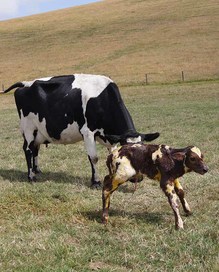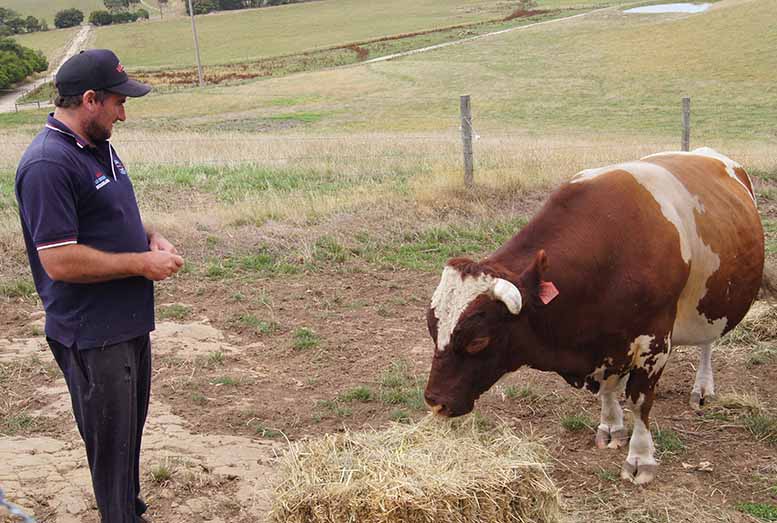
A Korinne farming family turned their backs on Big Milk and found a brighter new future. Geoff Ellis reports.
By Geoff Ellis
"If we had stayed with Murray Goulburn we wouldn't be milking now." In 2015 Daniel Hales returned to the family farm at Korinne. “I felt like grabbing the phone and swearing at them rather saying ‘thanks for your efforts’,” he laughs.
His parents, Paul and Carolyn, knew that modern farming was sending them broke. The monthly grain bill was rising. Poor fertility rates meant low milk production. They turned their backs on Big Milk.
Reaching back into history, the Hales decided to revert to a more natural system. It wasn't an easy decision. Their co-op shares represented four generations of family commitment. Paul’s great-grandfather was one of the original suppliers to the Kongwak Butter Factory and supplied Archie's Creek before Murray Goulbourn bought it out.
Daniel took a practical view. If what you’re doing isn’t working, you have to give yourself a chance by having a crack at something different. If you go broke, you go broke just the same.
Going organic wasn’t easy. Some thought it a bit too different. People stopped listening after the second sentence. Their Friesians couldn't cope without expensive grain. In the first year of full organic operation, the Hales had to sell a third of the herd, a heart-breaking decision for a farming family.
They bought in Jerseys and Ayrshires. “When you read books written a hundred years ago,” Paul explains, “you see how far from nature we have come.” The ascendance of North American genetics can be seen in paddocks across Gippsland. Big black and white cows with giant udders, awkward gaits and shortened life spans.
After the milk price, crashed people started listening. What do the Hales do differently?
Among many other strategies they have fewer cows per hectare. The cows eat chemical-free grass and the weeds are grubbed out manually. Dung beetles convert cow muck to nutrients; uneaten grass is mulched and the soil aerated.
The payoff is healthier cows, pastures and people. They’re not being pushed to their limits. All their milk is bought by Organic Dairy Farmers of Australia, which pays a premium price and the income doesn’t fluctuate as wildly as it did with Big Milk. That monthly cheque isn’t going to the grain and fertiliser supplier, and the vet bill.
As more farmers consider farm-gate and niche marketing as the way forward, Daniel recommends having a crack at organics.
One hundred and thirty years ago, Duncan and Mary McDonald disembarked at Inverloch. The farm they started in Korrinne is still going strong.
"If we had stayed with Murray Goulburn we wouldn't be milking now." In 2015 Daniel Hales returned to the family farm at Korinne. “I felt like grabbing the phone and swearing at them rather saying ‘thanks for your efforts’,” he laughs.
His parents, Paul and Carolyn, knew that modern farming was sending them broke. The monthly grain bill was rising. Poor fertility rates meant low milk production. They turned their backs on Big Milk.
Reaching back into history, the Hales decided to revert to a more natural system. It wasn't an easy decision. Their co-op shares represented four generations of family commitment. Paul’s great-grandfather was one of the original suppliers to the Kongwak Butter Factory and supplied Archie's Creek before Murray Goulbourn bought it out.
Daniel took a practical view. If what you’re doing isn’t working, you have to give yourself a chance by having a crack at something different. If you go broke, you go broke just the same.
Going organic wasn’t easy. Some thought it a bit too different. People stopped listening after the second sentence. Their Friesians couldn't cope without expensive grain. In the first year of full organic operation, the Hales had to sell a third of the herd, a heart-breaking decision for a farming family.
They bought in Jerseys and Ayrshires. “When you read books written a hundred years ago,” Paul explains, “you see how far from nature we have come.” The ascendance of North American genetics can be seen in paddocks across Gippsland. Big black and white cows with giant udders, awkward gaits and shortened life spans.
After the milk price, crashed people started listening. What do the Hales do differently?
Among many other strategies they have fewer cows per hectare. The cows eat chemical-free grass and the weeds are grubbed out manually. Dung beetles convert cow muck to nutrients; uneaten grass is mulched and the soil aerated.
The payoff is healthier cows, pastures and people. They’re not being pushed to their limits. All their milk is bought by Organic Dairy Farmers of Australia, which pays a premium price and the income doesn’t fluctuate as wildly as it did with Big Milk. That monthly cheque isn’t going to the grain and fertiliser supplier, and the vet bill.
As more farmers consider farm-gate and niche marketing as the way forward, Daniel recommends having a crack at organics.
One hundred and thirty years ago, Duncan and Mary McDonald disembarked at Inverloch. The farm they started in Korrinne is still going strong.
